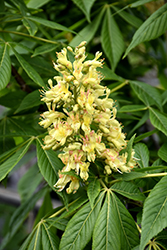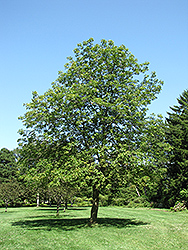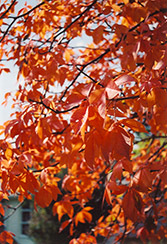Height: 26 feet
Spread: 20 feet
Sunlight:
![]()
![]()
Hardiness Zone: 2
Description:
An ideal choice for the small home landscape, with nice yellow flowers, good fall color and a compact growth habit, curiously fan-shaped leaves; susceptible to leaf scorch in dry sites, spiny seeds may necessitate some maintenance
Ornamental Features
Ohio Buckeye features showy spikes of creamy white flowers rising above the foliage in mid spring. It has dark green deciduous foliage which emerges light green in spring. The palmate leaves turn an outstanding coppery-bronze in the fall. However, the fruit can be messy in the landscape and may require occasional clean-up.
Landscape Attributes
Ohio Buckeye is a dense deciduous tree with a more or less rounded form. Its relatively coarse texture can be used to stand it apart from other landscape plants with finer foliage.
This is a high maintenance tree that will require regular care and upkeep, and is best pruned in late winter once the threat of extreme cold has passed. It is a good choice for attracting squirrels to your yard. Gardeners should be aware of the following characteristic(s) that may warrant special consideration;
- Messy
Ohio Buckeye is recommended for the following landscape applications;
- Accent
- Shade
Planting & Growing
Ohio Buckeye will grow to be about 26 feet tall at maturity, with a spread of 20 feet. It has a low canopy with a typical clearance of 2 feet from the ground, and should not be planted underneath power lines. It grows at a medium rate, and under ideal conditions can be expected to live for 60 years or more.
This tree does best in full sun to partial shade. It prefers to grow in average to moist conditions, and shouldn't be allowed to dry out. It is not particular as to soil type or pH. It is highly tolerant of urban pollution and will even thrive in inner city environments. This species is native to parts of North America.


